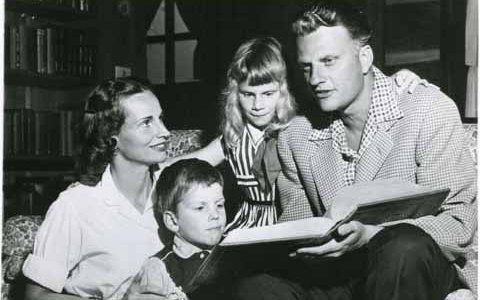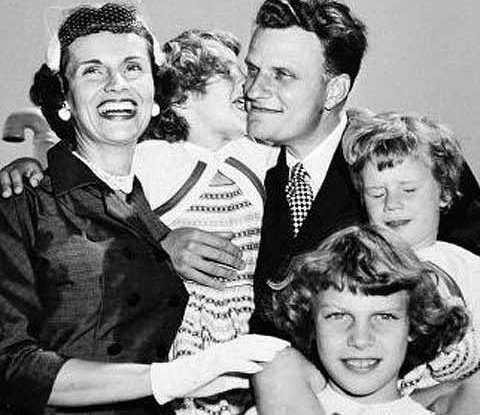Billy Graham’s daughter wants to hear from you.
She says it’s time to be honest. Ruth Graham, daughter of the famed evangelist, says she’s been through the fire and is ready to talk about her deepest frustrations and fears.

She also wants to hear what her readers are enduring. In fact, she’s willing to make a very personal promise: If you’ll write to her, commenting on her column “Safe Place: Being Authentic in an Inauthentic World,” she’ll write you back.
“I want to hear from you. I want to know what’s going on in your life,” she says, “I want to create a safe place where people can come and share anonymously.”
Why does she see the need for a “Safe Place” where readers can share their own failings and doubts?
She knows what it’s like to have to put on a false smile. The third of Billy and Ruth Bell Graham’s five kids remembers having to pretend nothing is wrong – even when her world was falling apart. All preachers’ kids endure that, but a famous evangelist’s kid has to be especially careful. Stepping out of line can result in a front page headline in the National Enquirer – and bring shame upon a beloved dad.

And there are other pressures that ordinary celebrities’ kids don’t suffer. If a famous clergyman’s daughter isn’t spiritual enough for the ever-gawking public, she had better know how to fake it – or endure constant witnessing, counseling and opportunities to come to Jesus offered by the well-meaning.
That wasn’t Ruth’s problem, however. She had a deeply spiritual experience at a very early age – and her parents kept the Graham kids out of the public eye. Little Gigi, Anne, Ruth, Franklin and Ned met scores of famous people who enjoyed her father’s friendship: Johnny Cash, John Wayne, Martin Luther King and every President from Eisenhower on – “but those were Mother and Daddy’s friends,” Ruth recalls. “We met them, but that was all.”

And as a girl she never had to fake spirituality, “I really did have a genuine relationship with the Lord,” she recalls. “I gave my heart to Jesus when I was seven, kneeling beside my bed with my mother. At age 11, I made that commitment public by going forward at the altar call at a church revival held by a friend of my father. Daddy went with me.”
As a 15-year-old, she left home for an exclusive boarding school in New York. There, “I came down with mononucleosis and I was miserable.” All alone, it was just her and God. “I just had to claim my faith as my own. At that point, it was no longer Mother or Daddy’s faith, it was mine.”
She avoided teenage rebellion – didn’t smoke, drink or do drugs. Although it was the height of the 1960s-70s counter-culture, she had no desire to join a hippie commune or hitchhike to San Francisco.
“I went to college and married and had children.” But in the 1990s, her world fell apart when her husband was unfaithful. After 18 years of marriage, Ruth was devastated. They went through months of counseling before admitting defeat. Then just a few months after the divorce, she remarried “on the rebound” but knew within 24 hours that she’d made a terrible mistake. Her life a shambles, she loaded up everything and sought refuge with her parents.
“I thought, ‘What are they going to say to me?’” she remembers. “As I rounded the last bend in my father’s driveway, Daddy was waiting for me. He wrapped his arms around me and said, ‘Welcome home.’”
What followed was a time of turmoil. At age 40, she was in personal, emotional and spiritual crisis. “I sort of went off the rails,” she admits, “I decided I was tired of doing it God’s way. But that just made things worse.

“I had thought I was doing everything perfectly. I was a good wife. I was a wonderful mother. I was active in the church and I was teaching Bible studies. So, why didn’t God take care of me?”
Her children suffered, too. One daughter developed an eating disorder. Her son entered a drug abuse rehabilitation program. Another daughter gave birth to two babies out of wedlock while still in her mid-teens.
How did Ruth deal with such a collapse of her world? She says she felt abandoned. “It was really a crisis of faith. How come the Lord didn’t intervene?” Why didn’t God protect her – keep her from having to go through the fire?
The answer is simple, she knows now: “He had something to teach me about the difficulties of life: to show me that none of us are exempt, that we all have hardships. We all have things that happen to us that we don’t ask for, but we have to endure.
“And it’s OK. It’s all part of God’s plan. I didn’t like having to go through that – none of us do.”
“But it was very important for me to have that experience – and to grow from it. I’m still growing. The story is not over. But that’s OK, God gives me grace. And God is a covenant-keeping God. He is faithful even when I am not. Now I’m living life. I am just living in the grace of God.”

Recently she was at her father’s bedside after he fell at home and had to be hospitalized. Has it been difficult watching such a great man, who she still lovingly calls “Daddy,” retreat from public view now that he has slowed down – and is well into his 90s? Does she ever wish she could miraculously restore him to the fiery young preacher who filled stadiums worldwide for 40 years?
“I told Daddy not too long ago that I am much more warmed by the embers than I ever was by the fire. I hate to see the physical disabilities that he has endured, but I have enjoyed this special time in his sunset years. He is not as distracted. He is gentler.
“He’s always been a wonderful person. It was hard for him that Mother went first, but God knows what He’s doing. Always before, we kids went home to see her. If he was there, that was well and good. But now that she’s gone, we go home to see him. And he loves it. And I love being with him.
“I remember one day when I was really beating myself up and taking responsibility for my marriage falling apart – just pouring my heart out. Daddy said, ‘Quit beating yourself up. We all live under God’s grace and we just do the best we can.’
“Whenever I go home, there’s always a bouquet of flowers in my room with a handwritten note that reads, ‘Welcome home. Daddy.’”

What has she learned through her personal ordeal?
She says she will never again attempt to live up to other people’s expectations. “For years, I was very good at fooling myself. I don’t know if I fooled other people – I certainly never fooled God.
“I have realized that I have an audience of One. As long as He’s happy with me, then that’s OK. You can’t please all those other people anyway. There’s always going to be somebody who doesn’t think you measure up.
“At each stage as I went through this, I knew I loved the Lord. There was no question of that. At each stage, He has taken me deeper. And I don’t like the fact that the deep things of God are taught in suffering.
“As a result, I know God’s grace in a way that I never would have otherwise. I’m learning to tell myself the truth. “
She wants others to enjoy that freedom, too.
“Transparency is so lacking today,” she says. “You and I feel like we can’t be honest. We have to protect ourselves, especially to hide any flaws that we have. We feel we have to put on our masks and say ‘Everything’s OK and I’ve got it all together and I’m doing just great.’
“But, people aren’t doing just great. They aren’t OK and they don’t have it all together.

“So, we hide it. We don’t feel we can be honest. We can’t take off that mask and be real. We fear that if we do, we’ll become targets — marginalized, criticized, victimized.”
“I finally decided that I was going to admit that I don’t have it all together – but God does.
“I want to share that and also to dialogue with my readers – so they can unburden themselves – making my column a confessional of sorts. And they will find no condemnation from me. I am not into shaming people.
“I believe in passing along God’s grace.”
Her column “Safe Place: Being Authentic in an Inauthentic World,” appears regularly on Beliefnet.


